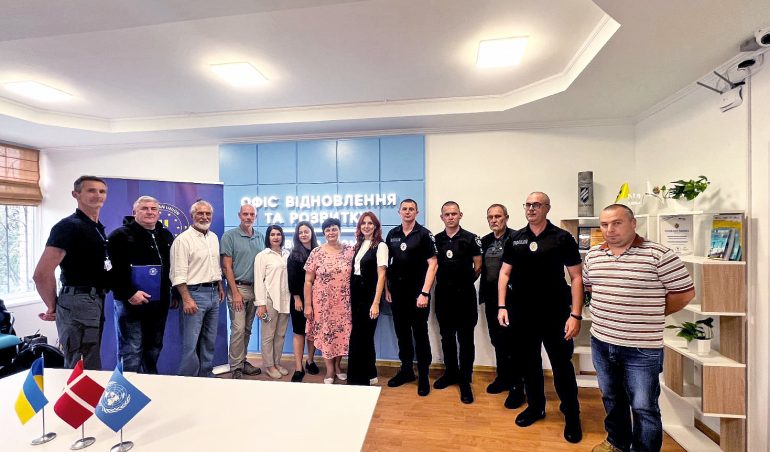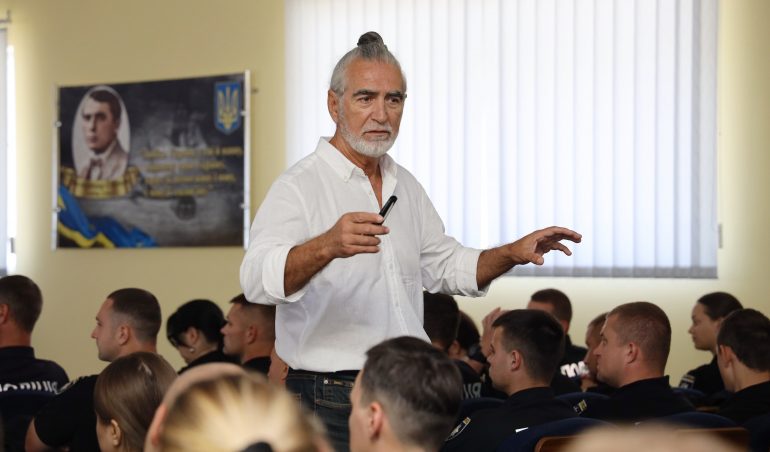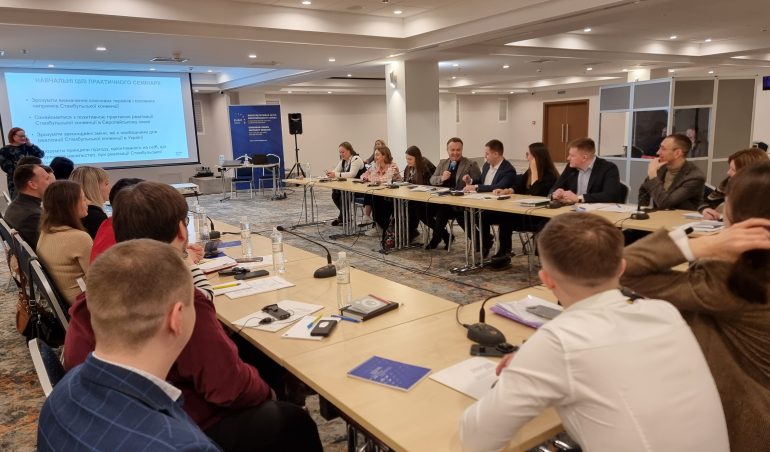Police and Civil Society: two perspectives that can meet with Community Policing
February 05, 2021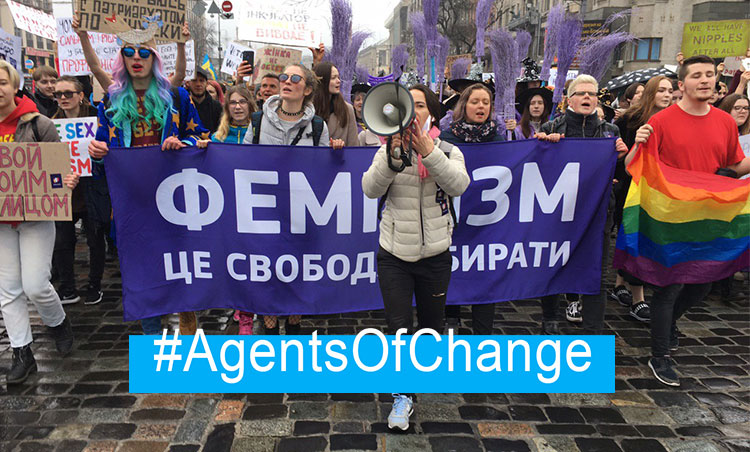
Ukraine’s vibrant civil-society sector plays a critical role in advocating for reform in the civilian security sector, and reform more generally. That is why the EU Advisory Mission (EUAM Ukraine) decided to launch the #AgentsofChange series, meeting with inspiring men and women who try to change the rules of the game in the country by carrying out inclusive projects and by taking action in their community. Chair of the Insight LGBT+ organisation, Olena Shevchenko here exchanges with Brendan Harkness, EUAM General Policing Adviser, on how the civilian security sector can include all minorities.
![]() My name is Brendan Harkness and I work as a General Policing Adviser for the EUAM. Today, we will talk about Community Safety, a multi-stakeholder approach for public security and one of EUAM’s priorities in the country. For that, I am meeting Olena Shevchenko, from the NGO Insight that provides assistance and support to Ukrainian LGBT+ communities. As agents of change, we will share our experience on how civil society organisations and the police can include all minorities and advocate for a more inclusive approach in the security sector, through the Community Safety concept.
My name is Brendan Harkness and I work as a General Policing Adviser for the EUAM. Today, we will talk about Community Safety, a multi-stakeholder approach for public security and one of EUAM’s priorities in the country. For that, I am meeting Olena Shevchenko, from the NGO Insight that provides assistance and support to Ukrainian LGBT+ communities. As agents of change, we will share our experience on how civil society organisations and the police can include all minorities and advocate for a more inclusive approach in the security sector, through the Community Safety concept.
What does the Community Safety approach consist of?
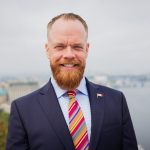 Brendan Harkness: The definition is in the name: it is all about the community, about different stakeholders coming together at the table to decide what they want the safety of their community to look like. This involves many different people and components of society. It is a wonderful model that allows each and every community to make decisions about their safety, that allows everybody to feel safe and secure. It is founded on community policing, on communication and on mutual respect for everybody in the society.
Brendan Harkness: The definition is in the name: it is all about the community, about different stakeholders coming together at the table to decide what they want the safety of their community to look like. This involves many different people and components of society. It is a wonderful model that allows each and every community to make decisions about their safety, that allows everybody to feel safe and secure. It is founded on community policing, on communication and on mutual respect for everybody in the society.
 Olena Shevchenko: To me, “Community Safety” is the same as safety for all, irrespective of whether we represent civil society, the police or the military. It is about sitting at the table and discussing what could be done to ensure that we live in a safe environment and share common values, with safety definitely being at the top of the list. I believe it is about a dialogue between the different communities.
Olena Shevchenko: To me, “Community Safety” is the same as safety for all, irrespective of whether we represent civil society, the police or the military. It is about sitting at the table and discussing what could be done to ensure that we live in a safe environment and share common values, with safety definitely being at the top of the list. I believe it is about a dialogue between the different communities.
What is the role of EUAM in promoting Community Safety?
O.S.: First of all, EUAM plays an advisory role with experts from various States with established security traditions coming to Ukraine. In a different format, these experts share best practices from their home countries. EUAM’s support also includes sitting together and discussing various issues. We can discuss how to improve service quality in Ukraine that will ultimately help reform the civilian security sector.
What are the main obstacles for LGBT+ inclusion and diversity in the security sector?
O.S.: When we speak about the obstacles faced by the LGBT+ community in Ukraine, we need to understand that safety is not just a word. It comprises many tools that we require to enable every member of society to live peacefully and without violence.
First, it is about visibility: law enforcement agencies simply refuse to admit that the LGBT+ community in Ukraine is vulnerable. It is subjected to violence and discrimination. As a result, we do not have data to base our activities upon. It is also about speaking up about and acting on inclusiveness. Even within the police, the government institutions or the military, there are LGBT+ people. We have noticed that, but we are still turning a blind eye to it. That is why inclusiveness is not just a word. It is about putting it into practice, to make this world better for everyone. It is also about making safety accessible for all, irrespective of one’s sexual orientation and/or gender identity.
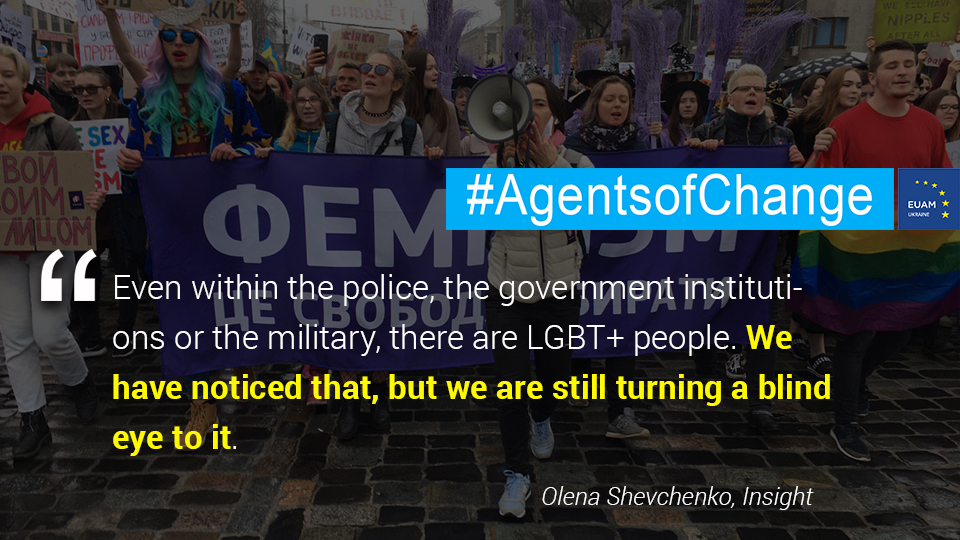
B.H.: The security sector involves many different aspects. In order for us [police officers] to show up and represent the communities that we are employed by and that we serve, we also have to be inclusive. That means many different things: it means demonstrating inclusivity to our communities, showing up for them, listening, taking the advice and bringing that onboard. But we also have to do that internally.
In order for us to be able to demonstrate and represent our communities effectively, we really need to demonstrate and represent our communities internally as well. That is one of the biggest challenges in policing for any LGBT+ community.
How to make sure that everyone (including LGBT+) feels equally safe and secure?
O.S.: For some reason, when we speak about the way police should work in the context of the LGBT+ community, the first thing I hear is that we have different values, vision and beliefs. That LGBT+ community is allegedly against some established moral principles. Let me remind you that when we speak about police work, professionalism should always come first. It is about doing one’s job well. And that is the first thing that comes to my mind when speaking about the professionalism of the police. It is about protecting people irrespective of the [minority] group they represent, whether it is LGBT+ or Roma community.
You are free to have your own views, but this should not affect the way you behave at work. And this is applicable not just to the police. We all have private lives, personal beliefs and principles. But in others, we should see first of all a person with their lives and principles. So I would say that professionalism should come on top of everything.
“Professionalism is about protecting people irrespective of the minority group they represent, whether it is LGBT+ or Roma community.” (Olena Shevchenko, Insight)
B.H.: In policing, two of the core principles are professionalism and integrity. As police officers, when we are responding to calls for service or interacting with our communities in any way, we certainly need to show up in a way that is professional. There are many different people that form a society, that have different ways of looking at things. In order for us to be able to serve our communities effectively, we also have to maintain our professionalism. We may not always agree. However, the reality is that everybody has a right to be here equally. So it is our job to stay professional and to treat every group of people with professionalism.
Our integrity is tied in with that. What are you doing when nobody is watching? When you are actually in a situation where nobody else is watching and your job is to actually help somebody, the impression you will leave on that person will last with them forever. Those are the small efforts we can make in order to show up for our community.
Do you have good examples of good cooperation with the law-enforcement agencies?
O.S.: Of course, we have examples of good cooperation with the police. This has been achieved thanks to our constant contacts in an effort to build cooperation. This has been done through training sessions that we organized inviting National Police, Patrol Police and Dialogue Police to participate. Security at mass events is another good example. I must note that it has significantly improved since the reform of the Patrol Police. We see that police can work and ensure public order. But there is always room for improvement and we need to continue improving our cooperation and communication.
What is your message to people who also want to make things change?
B.H.: Ukraine is a wonderful country, full of wonderful people with a rich culture. My advice to people that would like to join this important movement is to be brave and courageous. The more people show up for this cause, the more confidence the movement gains. Lean on the people that you get confidence from, on the friends around you, and show up for the cause because it is important. Until everybody feels equal, the work still needs to be done.
O.S.: If I were to give advice to social groups, those who suffer from violence and discrimination, I would call for cooperation. Let’s believe that Ukraine will win, that reforms will come through. Let’s believe in Ukraine and build it together. It is your participation that affects our future. We need to fight for our right to participate in the discussions and be part of this diverse community. Issues that have to do with us should not be considered without our participation. So my message is to be part of the discussion, participate in the decision-making processes, and monitor. Without control, the State will not be able to make our lives better. We are responsible for our future and we need to build our home together.
*The views expressed here are the interviewee’s alone and do not necessarily reflect the position of EUAM.


